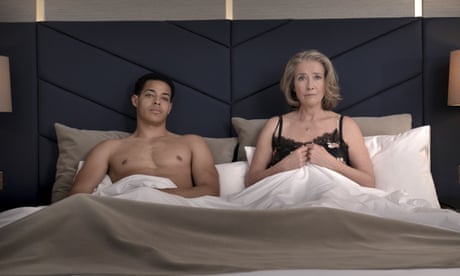H ollywood sex scenes tend to follow a predictable formula: hot, passionate and rarely anything short of euphoric. So the basis of Emma Thompson’s new film, Good Luck To You, Leo Grande , in which she plays a widowed teacher who hires a male escort in the hope of having her first orgasm late in life, is seen as truly boundary-pushing. But while films do not tend to depict women looking tense, frustrated or simply a bit bored during sex, evidence suggests that in real-life many women share the experience of Thompson’s character.
“Fifteen percent of women have never had an orgasm,” Thompson told ITV’s Lorraine Kelly, in a publicity interview this week, a figure that experts say is “plausible”. “I’m thrilled that Emma Thompson is doing this movie because for many years the general public has been actively misinformed by Hollywood about how women have orgasm,” said Prof Elisabeth Lloyd, a biologist at Indiana University and author of The Case of the Female Orgasm. “That’s what makes this so special.
” Lloyd’s research has highlighted the “orgasm gap”, in which a far higher proportion of women do not orgasm than men – after extensive research she put the figure at about 10%. “I think that number represents a mishmash of women who haven’t had partners who wanted to pursue it, women who haven’t wanted to pursue it themselves and women who are physically unable to reach that state,” she said. Dr Laura Jarvis, a sexual health doctor in Tayside, Scotland, said she saw patients with a range of reasons for not having an orgasm.
“Most of these women don’t have a physical problem – nerve damage or something to do with their anatomy,” she said. “Most of the time it’s about their own relationship with their sexual self, about permitting themselves to having sexual pleasure. ” Some women, she said, had suffered from negative experiences ranging from sexual abuse to religious taboos around sex.
“So many things can impact on you being able to relax and enjoy sexual pleasure for yourself,” she said. “All sorts of things stop women being able to do that. “These women always tell me they feel as if they’re missing out,” she added.
“Every Netflix drama, there’s people having orgasms in it. They feel as if they’re not normal and that perpetuates the stress. ” Many still feel “stigma and shame” when it comes to female masturbation.
“We’re so comfortable with men doing that,” said Jarvis. “With women it’s still seen as a bit naughty. It’s really important to take that guilt away.
Women need to learn how to pleasure themselves. ” Antidepressant drugs, particularly SSRIs, are linked to lower sexual arousal and lack of orgasm, while other factors may be more mundane. In a recent study, 20 married Iranian women referred to “lack of concentration on sex due to household and children problems, husband’s hurry, having a dispute and annoyance with spouse and lack of privacy”.
Unrealistic expectations, driven by films in which women seem to orgasm – often almost instantaneously – from unassisted intercourse may also play a role, Lloyd said. “That’s just not how women have an orgasm,” she said. “It’s a terrible way to have an orgasm.
” A study by Lloyd and colleagues involving 52,000 participants identified a combination of genital stimulation, deep kissing and oral sex as the “golden trio” for women for increasing the likelihood of reaching orgasm with a sexual partner. According to the research, only 35% of heterosexual women always or usually orgasm during vaginal sex alone, compared with 80% of heterosexual women and 91% of lesbians who said that always or usually have an orgasm with a combination of genital stimulation, deep kissing and oral sex – but without vaginal sex. Unlike male sexual dysfunction, the basis of female sexual pleasure has remained a relatively neglected topic, probably because not having an orgasm does not affect female fertility, according to Prof Mihaela Pavličev, an evolutionary biologist at the University of Vienna.
“The whole topic has been a bit weirdly discussed,” she said. “For a long time it wasn’t interesting to the medical community. All the focus has been on men with ejaculation problems.
” Sign up to First Edition, our free daily newsletter – every weekday morning at 7am BST She added that Sigmund Freud, who opined that women who experience pleasure from the clitoris rather than the vagina are “infantile” or frigid, and who labelled female sexuality “the dark continent”, had stigmatised female orgasm for several generations. “We have Freud to thank for the idea that it’s the mental state of the woman that’s problematic,” she said. “That idea has persisted.
” Jarvis thinks there has been a social shift towards placing more value on sexual pleasure and that younger women tend to be more proactive in coming forward to seek help. And while exciting sex may not be a priority for everyone, there is also evidence that having orgasms has wider benefits. “Orgasm is an effective way to release tension and stress,” said Lloyd.
“The hormones involved make you feel good, they help your blood pressure and mood. They are good for you. ”.
From: theguardian
URL: https://www.theguardian.com/society/2022/jun/11/orgasm-gap-how-hollywood-and-science-neglected-female-pleasure



